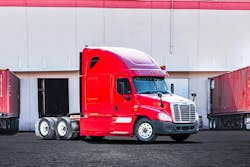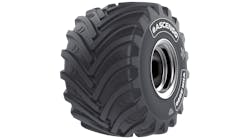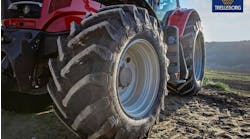What’s the next big thing in commercial truck tires? MTD recently posed this question to truck tire manufacturers and suppliers. Here’s what they had to say.
Comments are listed in alphabetical order, based on company name.
Chris Tavares, executive director, commercial marketing, Bridgestone Americas Inc.: Mobility has completely transformed because of technology and we believe it will continue to evolve as fleets become more in tune with their operation through data. By equipping truck tires with sensors, commercial fleets are receiving insights that are changing how fleets make business decisions.
We also see this technology expanding to the routes where fleets operate – and not just at the beginning and end of their journeys. For example, Bridgestone and Pilot Flying J partnered last year to install IntelliTire, Bridgestone’s automated tire monitoring system, into the canopies of more than 300 Pilot Flying J locations. Fleets that make pitstops at these locations can gather additional sensor readings, spot leaks, and take care of problems that may otherwise have resulted in roadside emergencies and unplanned downtime.
Aaron Murphy, senior vice president, CMA LLC/Double Coin: Tires to address the EV truck market is one focus that we see taking a priority in the future. These vehicles have performance characteristics that are different than conventional trucks.
Shawn Uys, head of Continental replacement truck tire, Continental Tire the Americas LLC: At Continental, we believe that in the B2B space, we are shifting to a digitalization model where connected products and services are the key to fleet efficiency and profitability. Our digital tire monitoring solutions are the future of tire management and allow us to partner with the fleet and the tire dealer to adapt to specific customer needs and not an ‘off-the-shelf’ product. This is exactly what fleets are seeking today.
Armand Allaire, executive vice president, commercial sales USA, Giti Tire (USA) Ltd.: One trend that will certainly continue in 2023 is the development of tires with greater efficiency and longer lifespan. We, as tire manufacturers, must constantly focus on reducing our environmental impact while working to match the evolution in commercial vehicles - whether diesel- or EV-powered units.
Commercial truck tires will continue to feature improved tread designs and more durable materials, allowing them to withstand more wear and tear without compromising on safety or performance. Advances in tire technology, such as smart tires and tire pressure monitoring systems, are likely to continue to gain traction as human resources remain constrained. These technologies can improve safety, reduce downtime due to tire-related issues and help fleet managers optimize their operations.
KJ Kim, TBR marketing and sales director, Hankook Tire North America: Driver education on both daily inspections and driving habits is being more widely adopted. Driving habits affect fuel efficiency greatly. Driving habits that include frequent braking and engine idling could shorten the lifespan and mileage of a tire and waste fuel. Routine checks on tire pressure and improving driving habits can reduce fuel consumption and help tires last longer.
Brian Sheehey, senior vice president, Ralson Tire North America: Product technology as it relates to improvements in product quality and the evolution of battery powered vehicles and machinery are a key focus of development over the next few years. As we see the lack of investment in internal transportation infrastructure (example: rail and pipelines), there will be significant dependence on trucking to move products from point to point. There will also be a focus on renewable or alternative energy power supply for trucks and other vital machinery. Equipment manufacturers are investing heavily in these new technologies so suppliers to these manufacturers need to invest significantly as well.
Joaquin Gonzalez Jr., president, Tire Group Intenational LLC (TGI): Under the current economic situation, the demand for long-haul transport tires has declined, but the demand for regional distribution light truck tires has risen steadily. I think we have seen most tier-one manufacturers blend the benefits of long-haul and regional tires into what most call a super-regional tire. This is something we feel will continue and makes it easier for resellers to stock a one-application-fits-all option.
Pete Salvan, vice president of sales, Prinx Chengshan Tire North America Inc.: We are paying attention to the electrification of fleets and growth of the medium duty truck market. There will be a lot of tire development for this sector of the market, with newer more modern tread designs, higher load capacities and lower rolling resistance.
Dave Johnston, senior manager, commercial product and business development, Toyo Tire U.S.A. Corp.: High-quality, innovative technology and design remain the cornerstones of commercial truck tires. As increased supply brings market stabilization, important performance attributes like low rolling resistance, traction, and durability will come to the forefront as fleets look for the best return on their investment. Alternate fuel vehicles and their potential unique tire requirements are an emerging market and a large part of our research and development moving forward.
Dan Funkhouser, vice president of commercial sales, Yokohama Tire Corp.: Take your pick - more regulation, increased last-mile operations, the proliferation of UWB treads and applications, EVs, autonomous trucks. The list goes on and on. While we have an eye on all of that and remain engaged in what the future of our industry will look like, we have to also remain focused on the here and now. We have to exceed the unmet needs of our channel partners today.
I can say with a high level of confidence that most of our partners aren’t currently focused on any of those things. Instead, they’re focused on their business, their people, managing inventory, safety, making payroll and doing all the things that will allow their businesses to survive and thrive in an uncertain market. We see it as our role to help them in any way we can, including new products, effective programs and a willingness to adapt so that we can continue to be the SmartSolution for fleet customers, dealers and OEM partners.
More truck tire suppliers will share their thoughts on www.moderntiredealer.com.




